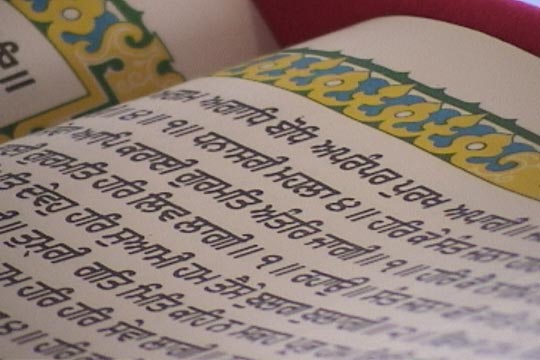
Sri Guru Granth Sahib: The History of the Sikh Soul
 Blogged by: Mewa Singh
Blogged by: Mewa Singh
In celebrating 300 years of our Guru Granth Sahib, I thought it might be worthwhile to republish an essay I had written for the Jakara Movement‘s inaugaral issue of its J.Khronicles magazine. Hope you enjoy….
Sri Guru Granth Sahib: The History of the Sikh Soul
Based on the work of the prolific Puran Singh
As the 10th Guru breathed his last, his Sikhs asked him who would be the next leader of the Sikh Nation. Guru Gobind Singh replied that they should put their trust in the infinite wisdom of the Guru Granth and the collective leadership of the Guru Panth. Together, Granth-Panth is the final Guru of the Sikhs. While every Sunday, we bow to the Guru Granth Sahib, how many of us have ever taken the time to understand what has been gifted to us? We are told to respect the Guru Granth Sahib, but don’t even know what it contains nor even have attempted to understand?
The 5th Nanak, Guru Arjan, who compiled the Guru Granth Sahib in 1604, wrote “Upon this Plate, three things have been placed: Truth, Contentment, and Contemplation.” The Guru Granth is the history of the Sikh soul, and its translation is to come through the Khalsa, the great figure of social reconstruction of human society that is our heritage and our duty, where shall reign love, and not hatred. The Guru Granth Sahib allows us to experience Truth through understanding Love, Mercy, and Grace. In the pages of our Guru, you won’t find stories of creation nor fables of men, but rather the pangs of a lover for their beloved. The Truth is not a God that lives on top of clouds in a Heaven. For us, the Truth resides within all of us and it is our duty to allow that Truth to come out and shine.
The Guru Granth Sahib is our ‘emancipation proclamation’ that boldly calls for us to be sovereign individuals. We have been free from all slaveries: mental, spiritual, and physical. Freedom of the human mind, body, and soul is the Guru’s passion. The Guru’s wished to see humanity living absolutely free, yet restrained. Giving ourselves in infinite self-sacrifice in the name of the Truth, washing away the selfishness of man in the supreme love of the Guru, is the simple, but extremely difficult path of discipleship and its greatest humanity. Such is the impart of the Guru’s Song.
Along with the directions for discarding are shackles, you find the song of Love. There is no other way to convey the passion of repeating the “Name of the Beloved” as in Guru Granth. The repetition of the “Name of the Beloved” seems repetitive for those that do not ache with the pain of love. Those that ache are not relieved by any philosophy, but by the repetition of the “Name of the Beloved.” There is truth that when one suffers the pangs of Love, just one mention of the one we love gives us solace. Only such a “love-afflicted” one can understand the significance of the repetition of the love lyrics of Guru Granth. Do not open the Guru Granth Sahib without opening your heart, for it is here that you will first feel the Guru.
Containing over 3384 hymns by 42 different authors, including the first five and the ninth Nanak, the Guru Granth Sahib is far more than a mere ‘religious book’ or ‘scripture.’ It is our Guru. Just as one candle’s flame lights another, so was Guru Nanak’s spirit passed through ten successive bodies. When the Guru realized the Sikhs had become able to lead themselves with his guidance veiled, the light was passed on to the Khalsa, which is the living spirit of the ‘Word’ in the Granth. The Sikh Religion has never been a philosophy of books or theorists, but it is a “discipline of life,” an ideal of brotherhood and sisterhood inspired by passionate devotion to the Truth, guided by the example of the Guru’s own life, and interpreted in the life-history of the Guru Khalsa Panth. As ‘People of the Shabad’ and the ‘next generation’ of Sikhs it is our duty to explore, understand, know, and love our Guru.














Hello Mr. Mewa Singh,
Would kindly explains what the word "mewa" means? Where could i get more informations about it?
Virtual education and the learning a person acquires at the university have no comparison. The virtual environment is deficient of the perfect socializing and interpersonal trainings whereas the university life is enriched with interpersonal grooming.
Highest quality fella toasts, or toasts. will most certainly be given birth to product or service ? from the party therefore supposed to become surprising, humorous coupled with enlightening likewise. best man speaches